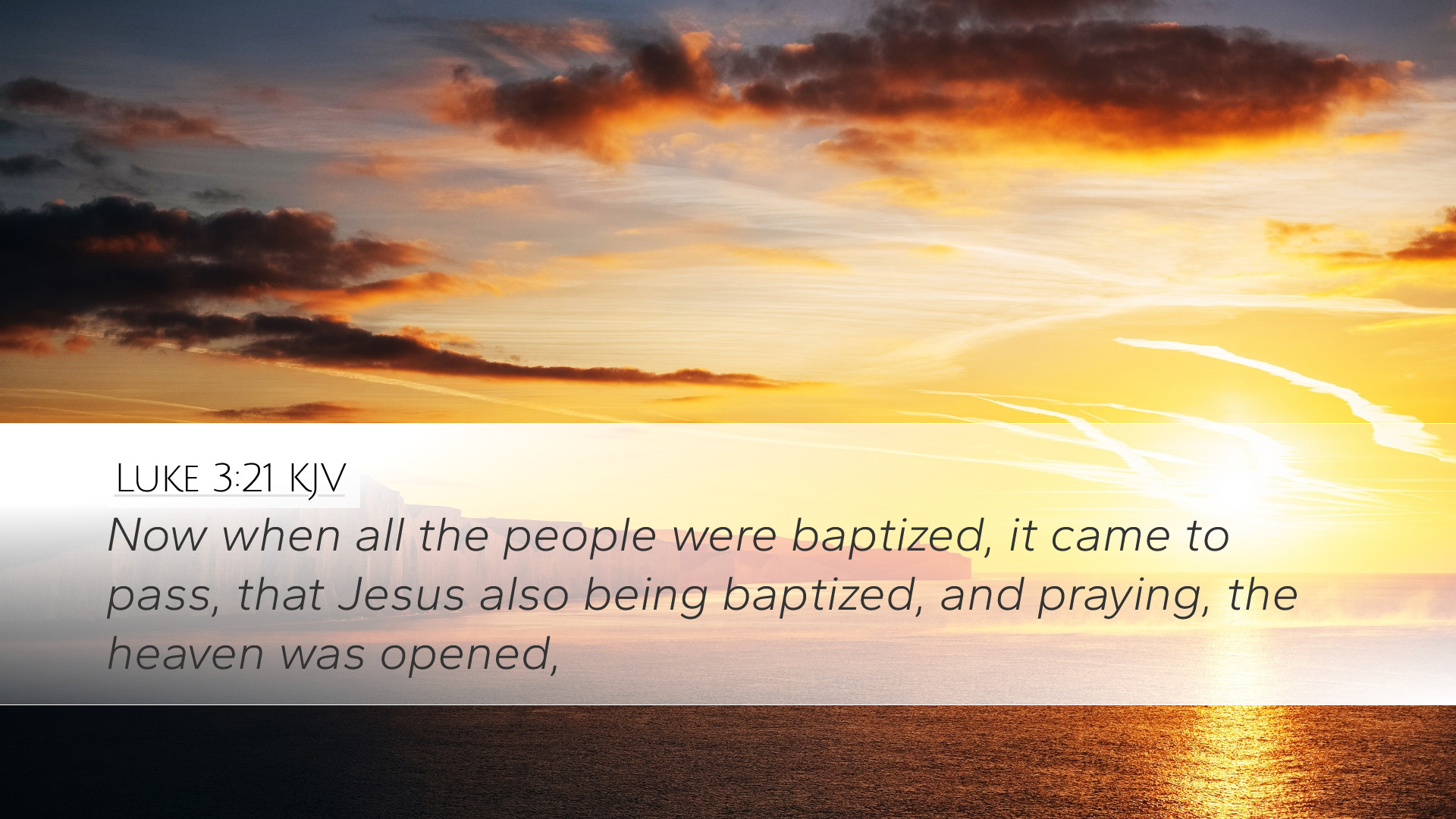Commentary on Luke 3:21
Verse: "Now when all the people were baptized, it came to pass, that Jesus also being baptized, and praying, the heaven was opened."
Introduction
In Luke 3:21, we witness a significant moment in the ministry of Jesus Christ and the inauguration of His public work. This verse marks the transition from the preparation of John the Baptist to the revelation of Jesus as the Messiah. It encapsulates the themes of identification, prayer, and divine affirmation. The baptism of Jesus stands as a central event that not only aligns Him with humanity but also highlights the Trinitarian presence and purpose at this pivotal moment.
The Context of Baptism
John the Baptist's Ministry: Matthew Henry notes that John’s ministry was characterized by a call to repentance and baptism for the remission of sins. His work prepared the way for Jesus, and his call for baptism set a standard for the recognition of sin and the need for redemption.
Significance of Baptism: Adam Clarke elaborates that baptism symbolizes purification and commitment. For Jesus, who was without sin, His baptism was not for repentance but an act of obedience and humility, identifying Himself with those He came to save. He set an example for believers, demonstrating that true discipleship involves following God’s commands even when one is not in need of repentance.
The Act of Baptism
Jesus' Participation: The phrase "Jesus also being baptized" signifies His identification with humanity. Albert Barnes suggests that this was an important aspect of His ministry, as He expressed solidarity with the human condition, though He Himself was sinless.
Prayer: The addition of "and praying" signifies the importance of prayer in Jesus' life. Matthew Henry emphasizes the connection between baptism and prayer, suggesting that Jesus’ prayer at this moment indicates His dependence upon the Father and the importance of seeking divine affirmation in all acts of obedience and service. This model of prayer is crucial for believers to emulate.
The Heavenly Response
The Opening of Heaven: The phrase “the heaven was opened” is a profound theological statement. Adam Clarke points out that the opening of heaven signifies divine favor and the accessibility of God’s presence. This moment serves as a precursor to Jesus’ ministry and highlights the divine endorsement of His mission.
Divine Affirmation: This moment was not only significant for Jesus but also for the witnesses. Luke presents a scene where the barriers between heaven and earth are removed, illustrating the importance of Christ’s role as mediator. Matthew Henry notes that this opening of heaven signifies not only blessing and approval but also the commencement of a new era in God’s relationship with humanity through Christ.
Theological Implications
Trinitarian Presence: This scene is deeply Trinitarian, as the Father, Son, and Holy Spirit are all present. Barnes states that the presence of the Spirit descending like a dove serves to affirm Jesus’ identity as the Son of God. This Trinity in action reveals the oneness of purpose in redemption.
Affirmation of Identity: The baptism serves to affirm Jesus’ identity as the Messiah. The heavenly endorsement is captured in subsequent verses, where God proclaims, “You are My beloved Son.” This moment reinforces the connection between Jesus’ mission and divine purpose, setting the tone for His ministry.
Practical Applications for Believers
-
Emulating Jesus’ Humility: Believers are called to follow Christ's example of humility and obedience. The act of Jesus being baptized, despite being sinless, signals a call for Christians to embrace their identity in Christ and participate in the ordinances established by Him.
-
The Importance of Prayer: The emphasis on prayer highlights that all acts of faith should be enveloped in communication with God. Believers should cultivate a strong prayer life, particularly in moments of significant decisions or transitions.
-
Understanding Our Identity in Christ: Just as Jesus identified with humanity through baptism, believers are encouraged to understand their identity as children of God, beloved and affirmed by the Father. This identity should motivate them towards righteous living and faithful service.
-
Participating in God’s Mission: The opening of heaven symbolizes the mission of God breaking into the world. Believers are called to participate in this mission, reflecting on how they can be instruments of God’s grace in their communities, following the example set by Jesus.
Conclusion
Luke 3:21 is a profound moment in the narrative of the Gospels that lays the groundwork for understanding Jesus' identity and His mission. As we contemplate this passage, we reflect on the humility and obedience of Christ, the significance of prayer, and the divine affirmation present in His baptism. For pastors, students, theologians, and Bible scholars, this verse serves not only as a historical account but also a theological reflection on the nature of Christ and the nature of discipleship. The call is clear: to embrace our identity in Him, to follow in His footsteps, and to live out the mission to which we are called.


